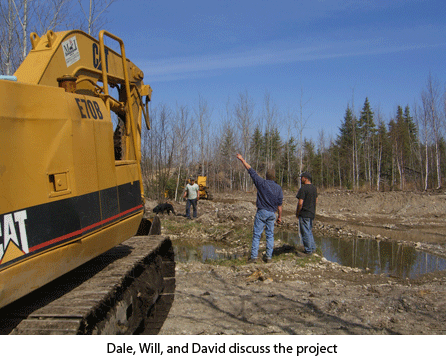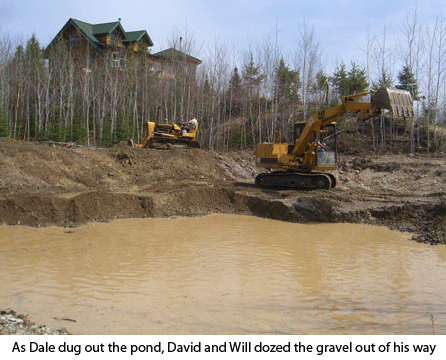This Friday, our friend, Dale Rinne, brought his excavator over and not only dug out the footings for Will’s bridge over the creek, but dug out our spring catchment basin, making a nice, attractive pond. It isn’t overly deep, but will hold thousands of gallons of water for not only emergency fire fighting, our garden/orchard irrigation, but also for wildlife too. The deer already would rather drink from our spring than the beaver pond or creek.
David stayed home from school (excused absence) to help doze the gravel away that Dale dug out. We’ll be using this gravel on our mile-long driveway, making that nice. This is a totally win-win situation! And after all that nice gravel is hauled onto the drive, we’ll grade and cover the banks with black dirt and plant wildflowers and ferns, making the whole area totally gorgeous! I’m SO happy with this project! After the silt settles out of the water, it’ll be clear and gorgeous. When our lab, Spencer, swims in the pond, his coat is wonderfully soft and shining. I think I’ll use that water on MY own hair!
Readers’ Questions:
Making sauces
In the last Ask Jackie blog sent today, “tax day”, a lady was telling you about how she makes beef broth. You commented that this is the way you do tomato sauces to save all of the constant attention and stirring. Could you please tell us the steps you take in making sauces.
J. Michael Ledbetter
Jamestown, Tennessee
Sure. All I do is run my tomatoes through my tomato strainer, removing seeds and skins. This leaves a puree. Instead of simmering it for hours to thicken it, risking scorching as it gets thick, I put it in a turkey roasting pan, with the cover off, in my oven, with only the lowest setting. I leave it for hours, only stirring it once or twice. Often this is overnight; I usually get up to answer “nature’s call” a time or two, so I stir it then. In the morning, it’s usually nearly thick enough to can. I take it out of the oven, add spices and other ingredients, depending on what I’m making (catsup, barbecue sauce, spaghetti sauce, etc.), then finish it on the stovetop, ladle it into jars, and process it. That makes these foods much quicker and much less work. That I love! — Jackie
Making tomato sauce
We started gardening and canning last summer. When we canned tomato sauce some of our batches had a burnt smell and taste to it while other batches did not. How can we prevent that from happening this year?
Frank Henry
West Mansfield, Ohio
You probably had some batches that scorched during the boiling down process. This is why I switched to oven cooking down my tomato sauces (see above question). You must be very careful not to scorch your tomato sauce as it thickens, for even a little scorching on the bottom of a pan will affect the taste of all of the sauce. You need to keep stirring as the sauce thickens. Electric stoves are particularly bad for this. I have a friend who puts a cast iron griddle on top of her electric burner to spread out the heat when she makes tomato sauce. It works for her! — Jackie
Storing dried pasta
My question is on storage of dried pasta products. I know that the pasta needs to be in airtight storage, but can I store the boxes or bags of pasta in an airtight container to keep the bugs out or do I need to take the pasta out of the store-bought containers and put it in airtight storage?
Stacy Dayton
Haralson, Georgia
I store most of my store-bought pasta in the bags/boxes that it comes in, in another airtight container, such as my popcorn tins or garbage cans. If you’re having trouble with pantry moths in your grain/flour products, I’d freeze all the bags BEFORE you store them, just to be sure. And invest in pantry moth traps; they’re cheap and quite effective. — Jackie
Cooking old dried beans
We have Jacob Cattle Beans that are several years old. Have tried making baked beans with these but they never seem to soften up and are really quite hard even after baking for 6-9 hours. What preparations should I do prior to baking these beans?
Rhona and Brad Barrie
Strong, Maine
Are you soaking the beans overnight? Almost all dry beans must be soaked prior to baking so they get tender during baking. If they still won’t get soft enough, I’d recommend making up a batch of baked beans to can (see my canning book), then can ’em up. The pressure canning makes even old beans get tender. I love that! — Jackie
Volunteer pumpkins
Jackie, last fall I threw my daughter’s Halloween pumpkin into our composter, and I guess it didn’t compost, because now I have about 7-8 seedlings that are sprouting up in my garden. The seeds must have survived tilling, when we planted our garden a month ago. The plants are growing up around some herbs and a few tomatoes. They are doing fantastic, as is the rest of my garden, but I’m wondering if they’ll choke out my other plants? Who knew pumpkin seeds could be so hearty? Any suggestions on how to keep everything going? I’ve never grown pumpkins before, and I’d like to keep them going if they won’t hurt my tomatoes and herbs.
Andrea Del Gardo
Myrtle Beach, South Carolina
You’ve discovered one of the surprises in gardening! I always have a few wildlings in my garden every year that I can’t bear to kill. But your pumpkin vines WILL cover your tomatoes and herbs. I’d suggest transplanting the pumpkin plants, while small, to a location where they can grow happily. Be sure to take plenty of soil so you don’t stress the roots. — Jackie
Preventing seeds from molding
I tried to dry some asparagus bean seeds last year (to plant this year) but they got moldy. How can that be prevented? Can a moldy seed still become a healthy plant?
Jack Kavanaugh
Groton, Connecticut
To dry seed, just lay the mature seed out in a pie plate or other large, flat surface, in a warm, dry location. Every few days, stir them around with your hand. In a week or two, they should be dry enough for storage. Store them in an airtight container such as a tin or jar. That way they can not get damp from room humidity or other moisture, which will cause mold.
Sorry, but most moldy seed is not viable. You can try a few seeds folded up in a damp paper towel or wash cloth. Keep them damp for two weeks, in a warm location. If they are good, you’ll notice sprouts. If not, there will be nothing but possibly more mold. — Jackie
Starting rhubarb
My neighbor would like a start of rhubarb. My plants are about 12 inches high now. When is the best time to divide this? Thanks for all your help last year, this year the rhubarb is nice & healthy.
Julia Crow
Gardnerville, Nevada
This would be a good time to divide it, providing your plants are well established. Dividing young plants is hard on them, so be sure they are at least three years old before doing it. I’m glad your rhubarb has improved! — Jackie
Storing whole wheat flour
Last year I purchased about 20 lbs of whole wheat flour. I vacuumed packed it as soon as I got home. It is kept in a food grade bucket, in the coolest part of the house. I read that it spoils with time. Do you believe the vacuum seal will slow that process down? I have started using it in my cooking now.
Vern
Urbana, Illinois
Yes, I think you’ll find that vacuum packing will slow down fresh grains’ tendency to get rancid after storage. It won’t “spoil,” but can become rancid. If it tastes and smells fine, it still is. Enjoy it. — Jackie
Canning bulk buys
Can large bulk buys from warehouse stores be recanned. Products such as ketchup, olives, bbq sauce, fruit, etc?
Susan Shupe
Greeley, Colorado
Re-canning bulk foods is in the “experimental” category, as there is no “expert” advice. However, I’ve done it for years, using the “normal” times and/or pressures recommended for the food you are going to re-can, as though it were fresh. I heat it up to simmering, pack it and then can as normal. And I haven’t had a failure, yet, after years of doing so. I started doing this with my own foods, such as canning tomato sauce, then later on when I had more time or cheap meat, making spaghetti sauce, meatballs in tomato sauce, or barbecue sauce, etc. — Jackie





Jackie: I read on your blog that you re-can food items that you buy in bulk like tomato sauce etc. Why would you re-can it instead of just leaving it like it is. Maybe I don’t understand the concept but please explain why if you bought a lot of tomato sauce you would bring it home and re-can it. Sorry if this is a dumb question.
Nancy,
YES! We got our box of goodies. Wow, not only almonds, but cashews and pecans, too. Thank you so very much!!!
Jackie
Emily,
Please tell your four year old that there are not fish in the pond. There WILL be frogs, toads and turtles, soon, though. No, we won’t be planting fish, as it isn’t deep enough to not have them become oxygen starved and freeze out in the winter. We DO have fish in our beaver ponds, though, and they hang out by our spring’s outlet, so they also love our water. The mud is already starting to clear and the pond is almost full to overflowing.
Jackie
Oops. Just saw where I posted my question in the wrong place so copied it and posted it over there!
But WE DO THANK YOU FOR ALL THE IDEAS YOU SHARE!!!!
Jackie, Does rhubarb grow well in the south (north central Alabama)? I honestly don’t know of anybody around here that grows it. Daughter-in-law has a greenhouse this year on the farm and it’s growing well and we’ve read so much great stuff you do with rhubarb we’d like to try it?
Since we don’t know anybody that has any to be divided to get a start, what do we do, order seed or what????
Thanks for all the info you share!
Did your box come yet? The pond will be wonderful!!
Just thought I would share: my four-year-old was very concerned about your muddy pond. He told me that fish in there would die. I told him that the pond was only muddy because they were working on it, but once it was clear, fish would be fine in there. So, we were wondering, will you plant fish?
Comments are closed.